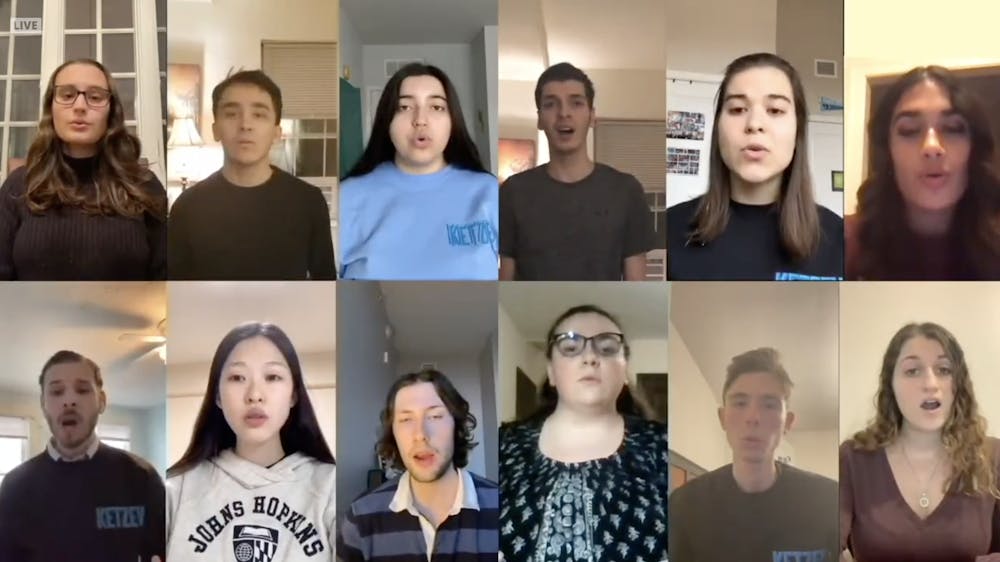The Office of Multicultural Affairs (OMA) hosted its 33rd Annual Culture Show on Friday, April 23 with the theme of “Connected from Afar.” Each year, the Culture Show gives student groups on campus the opportunity to share their cultural heritage through music and dance. Due to the pandemic, this year’s event was held over Zoom and was open to all Hopkins students and faculty.
The program featured performances from a whopping 19 different groups, amounting to a show nearly one hour and 45 minutes in length. From ¡Baila!’s spirited dance routines to Ketzev’s pristine harmonies, this year’s show was dynamic and endlessly engaging.
Junior Maya Bussey, who served as the assistant director of productions for the show, offered some opening remarks. She touched on the challenges that the pandemic presented to the Culture Show.
“We began planning this show an entire year ago. With many possibilities hanging in the air, we were unsure whether or not we would be able to put on a show this year,” she said. “This past year has been filled with unexpected challenges, and everyone has had to adjust — to being on Zoom, to not seeing friends face-to-face and to missing our in-person events on campus. However, despite all of us being across the world, and in many different places, we are all still a part of the Hopkins community.”
The show then began with three short numbers from Blue Jay Bhangra, the University’s co-ed Bhangra dance team. Their performance combined energetic, full-body dances with Western-style Punjabi music in the background. I found Blue Jay Bhangra’s performance to be an impressive kick-off; it definitely set the bar high for its polished execution.
There were many other dance groups featured that night, including Lan Yun Blue Orchids, ¡Baila!, JOSH, Korean Pop Motion (KPM), Shakti and Somapa Thai Dance Company, a Washington D.C.-based dance troupe. Lan Yun Blue Orchids and Somapa Thai Dance’s performances stood out for their graceful and restrained execution, but I also enjoyed the dances by ¡Baila!, JOSH, KPM and Shakti for their energetic takes on modern music. The groups brought together videos of individual dancers and socially distanced ensembles of dancers in sync, with diverse selections of music reflecting each group’s cultural heritage.
A few a cappella performances were also interspersed throughout the program, which kept the Culture Show engaging.
The Gospel Choir gave a very moving rendition of a song titled “Forever You’re My King” by Martha Munizzi. Ketzev’s performance also stood out; their vocal delivery was incredibly polished and the members handled the winding chord progression of their song “Jerusalem of Gold” well.
Kranti, Adoremus, Humming Jay and Music Dynasty also gave strong performances. Adoremus gave an inspiring a cappella cover of “Sunday Best” by the musical group Surfaces, while Kranti delivered an original mashup of a song in Hindi called “Pal” (from the movie Jalebi) and “Lovely” by Billie Eilish and Khalid. Humming Jay sang a cover of “No Makeup” by Zion.T, a Korean R&B singer, while Music Dynasty performed an original arrangement of a piece called “You Exist in My Song.”
As with the dance acts, there were several musical groups outside of Hopkins joining the night’s performances: Uptown Boyz, Sahel and Dina Maeva. Uptown Boyz is a D.C.-based intertribal Native American drum group that performs powwow and ceremonial music. During the Culture Show, they played an intertribal song that is traditionally used to gather dancers and singers for powwows. Sahel, a band that explores intersections between Latinx and Black diaspora identities, performed songs exploring remembrance of their ancestors and examining the historical injustices of slavery.
I especially liked Dina Maeva’s singing, which blended R&B harmonies with rhythms from Madagascar, Maeva’s home country. She sang two songs: “Looking Glass,” a song she wrote with her band BeMaeva, and a cover of “Case,” a song in Igbo by Teni. Maeva’s suave vocals fit nicely with the laidback guitar grooves in the background.
The inclusion of outside groups was a unique aspect of this year’s Culture Show. Masuma “Missy” Islam, the programming administrator for OMA, thanked and acknowledged these performers.
“I want to thank our extended vendors and performers for taking time to share your talents with us as well,” she said. “This pandemic allowed us to connect with community talents as well as connect with artists who are globally recognized.”
Though the offerings throughout the night could be grouped into renditions of songs or dance numbers, several performances didn’t neatly fit into these categories. Ui-Seng Francois, a Peabody student pursuing a Bachelor of Fine Arts in dance, shared an “autobiographical dance film” titled Life of a Lotus. She deftly combined spoken word, music and dance through the medium of film to tell a personal story about what Baltimore, her hometown, meant to her. Delta Xi Phi, on the other hand, gave a short Zoom skit which delivered a message about embracing everyone’s unique cultural backgrounds as a way to connect during the challenges of the pandemic. Sigma Sigma, who presented shortly after the intermission, shared one of their past stroll shows.
Shakti wrapped up the Culture Show with a rousing Indian classical dance piece, after which OMA Assistant Director of Programming Kwame Phillips gave some concluding remarks.
“Congratulations to the production team on a wonderful project,” he said. “You all spent hours of time, energy and effort to make sure that the 33rd Annual Culture Show happened. You did it from afar and made sure that diversity is not only valued but seen and uplifted across campus and through the virtual world.”
This year’s Culture Show stood as a testament to Hopkins students’ ingenuity — their ability to coordinate performers by group members living thousands of miles apart, their capacity to adapt to online performance platforms and their resilience throughout the pandemic.
If you missed it, you can head on over to the event’s CampusGroups page and click on the meeting link to take you to a recording of the show.





